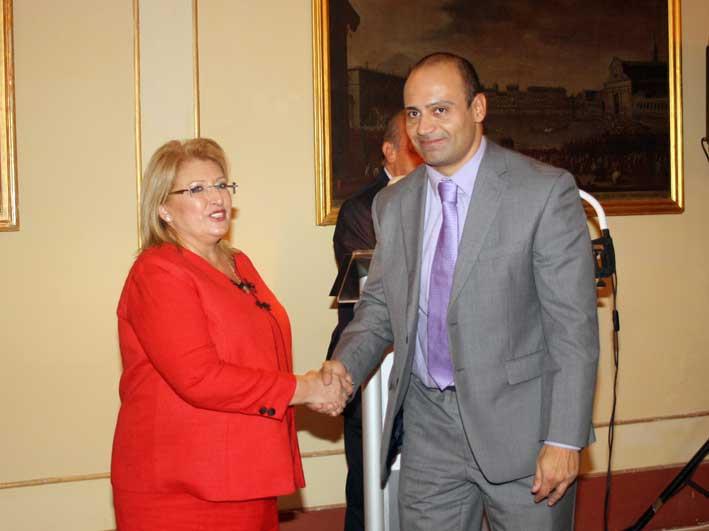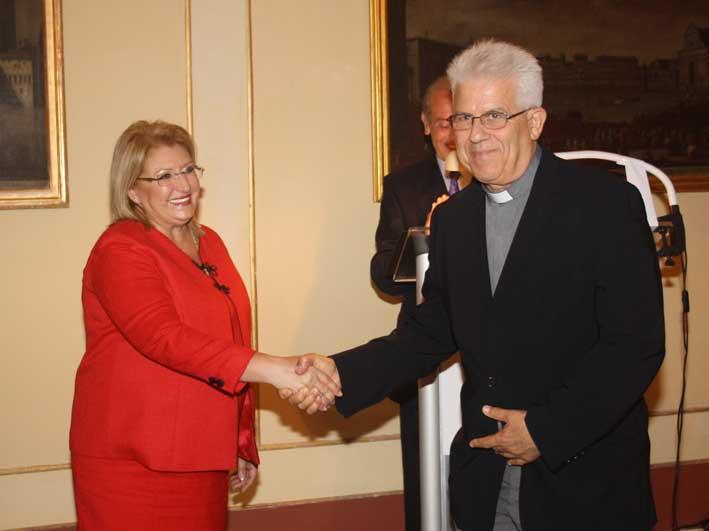MOAS receives the Peter Serracino Inglott Award
Last year, the Today Public Policy Institute introduced an annual award as a tribute to Father Peter Serracino Inglott, who was a founder member of this think-tank. The award was to be given to any individual or organisation for civic engagement defined as: "the process of working together to make a positive difference in the life of our communities and developing the combination of skills, knowledge, values and motivation to enhance our quality of life."
The first-ever award ceremony took place last month at Verdala Palace under the gracious patronage of the President.
There were seven nominations for the Award. Here they are: Mr Anselmo Bugeja, a volunteer for Fondazzjoni U; Mr Philip Chircop, Founder President of Nanniet Malta; the Rev. Emmanuel Cordina, founder of the OASI centre in Gozo; Mr Maurice de Giorgio, the late Founder President of Fondazzjoni Patrimonju Malti; Din l-Art Helwa; Hospice Malta and the Migrants Offshore Aid Station or MOAS.
 Mr Martin Scicluna the Director General of TPPI, told the audience that the Judging Panel had faced an extremely difficult choice but after very careful consideration the winner was the Maritime Offshore Aid Station (MOAS for short). The citation for the Award read as follows: "The Migrants Offshore Aid Station was founded by Christopher and Regina Catrambone, two private citizens who have made their home in Malta. They were responding to the question asked by Pope Francis after the Lampedusa tragedy two years ago: "Who is responsible for the blood of these brothers and sisters of ours?"
Mr Martin Scicluna the Director General of TPPI, told the audience that the Judging Panel had faced an extremely difficult choice but after very careful consideration the winner was the Maritime Offshore Aid Station (MOAS for short). The citation for the Award read as follows: "The Migrants Offshore Aid Station was founded by Christopher and Regina Catrambone, two private citizens who have made their home in Malta. They were responding to the question asked by Pope Francis after the Lampedusa tragedy two years ago: "Who is responsible for the blood of these brothers and sisters of ours?"

The Catrambones (Christopher comes from New Orleans) firmly believe that no one deserves to die while trying to seek shelter and that we all have a responsibility to contribute to reducing loss of life on our own door-step whenever we can.
A press release was issued after this event in which the Judging Panel gave some heartrending statistics of death in the Mediterranean and stated that it is the world's most lethal border crossing. "More than 6000 people have died in it over the past two years, 3000 in 2015 alone. Since MOAS was first set up in 2014, using their own search and rescue vessel, Phoenix, it has rescued almost 12,000 men, women and children in the central Mediterranean, the youngest just two days old. It conducted 32 rescues between the months of May and September of 2015 alone. The majority of those rescued were asylum seekers and refugees."
***

The MOAS initiative has led to such an upsurge of interest and donations that the decision has been taken to expand its operations to include the Bay of Bengal in South East Asia at the end of the year. Mrs Catrambone told me: "Our job in the Mediterranean is not over but we now feel it is our responsibility over the winter months to use the M.Y. Phoenix in another part of the world facing an equally challenging but severely underreported crisis. Through this action, MOAS will be shedding light on another aspect of this pressing global phenomenon in an area where there is no known NGO rescue presence at sea. Once the monsoon rains subside, tens of thousands of Rohingya and others are expected to resume their dangerous sea crossings. You might also know that MOAS is about to launch one more live saving mission in the Aegean sea in the upcoming days."
MOAS has captured the imagination of the world to migration issues and has shaped the debate on the merits of private citizen action - civic action - in humanitarian affairs.
I happened to discover that following this award, on 17 November Signora Catrambone went up to Rome where she received the second grade Medaglia di Ordine al Merito della Repubblica Italiana (Officer grade) from Presidente Mattarella for her work with MOAS.
***

In her speech the President warmly congratulated Signora Catrambone whose Award had very aptly coincided with the Valletta Summit on Immigration. Her Excellency also stressed referring to the Award, that "In reality there were no winners or losers. Only hard-working participants, all of whom were worthy of a prizes for the enormous contribution they had made over the years to civic society in Malta."
Also making interventions in the Award Ceremony were Professor David Attard, a Judge at the International Law of the Sea Tribunal and former student of Fr Peter, who paid a warm personal tribute to his memory.
***
I found Elena Peresso's piece, read by Prof. Claire Vassallo, very moving and I shall quote it extensively. Elena, also a former student of Father Peter and a former Adviser to the EU Development and Trade Commissioners referred to the plight of migrants and refugees in her thought-provoking intervention. She said that that night was one of remembrance - of Fr Peter and his intellectual legacy, but also of millions of nameless persons worldwide who undertake undignified and perilous journeys - sometimes fatally - in search of a better future. "Had this been the podium of Sir Temi Zammit Hall and a class in history of Mediterranean civilization with Fr Peter, we probably would be discussing why there can be no civilization without migration..... migration is still a global phenomenon. War, drought and social pressures still drive people away from their homes. What has changed since the Neolithic revolution is the availability of mechanized transport, telecommunications and globalised trade...and the digital age...We are more aware of international affairs while we carry on our daily lives. Yet sometimes, and understandably so, we are mainly concerned with what happens in our back yard." She pointed out that the common Maltese perception that migration is intrinsically a Mediterranean phenomenon with Malta at its epicenter. "Given that over a quarter of the world's refugee population is to be found in Africa, that cannot be the case. And out of the almost 600,000 migrants arriving by sea in Europe this year, 76% of them landed in Greece and two-thirds of those arrivals were from a close neighbour: Syria."

***
But migration is an emotional issue. "One where the main belief is that migration constitutes an attack against civilization. All over the world, nationalism is rearing its ugly head. It takes a look at the telephone directory of any country to come to the conclusion that we are all from somewhere else. What is certain is that the current refugee crisis in Europe is putting human values severely to the test. Different solutions are being tried, not all of them effective, some of them downright populist. The stark truth is that there is no single solution to a crisis that is a multidimensional one, affecting foreign policy, internal security, law enforcement and also community relations." Ms Peresso pointed out that if Europe did not have the European Union, it would be much more difficult to coordinate an international response to what is essentially an international problem. ... the current consensus involves more sharing of responsibilities than before, more cooperation with source countries and a greater determination to help countries in conflict attain peace.
Ms Peresso said that the tragedy of migrants distressed at sea brings together two of Fr Peter's major and longstanding concerns. One is his ethical conviction that the loss of any person's life is a loss for all of us: in saving others, he believed, we are saving our own humanity. Second, he wanted the Mediterranean Sea to stop being regarded as some kind of wilderness and to be reclaimed, instead, as a common home of all the societies that bordered it. "Tonight MOAS is rightly singled out for its activities. We should also acknowledge the contribution of other organizations and also many unnamed individuals, who respond to hardship with compassion, humanity and yes, civilization." Ms Peresso made us all stop and think.
Fr Peter would have been very pleased with the whole well-organised evening. Well, Mr Scicluna was a military man for many years and all was organized with military precision but more importantly it was also a matter of the heart.